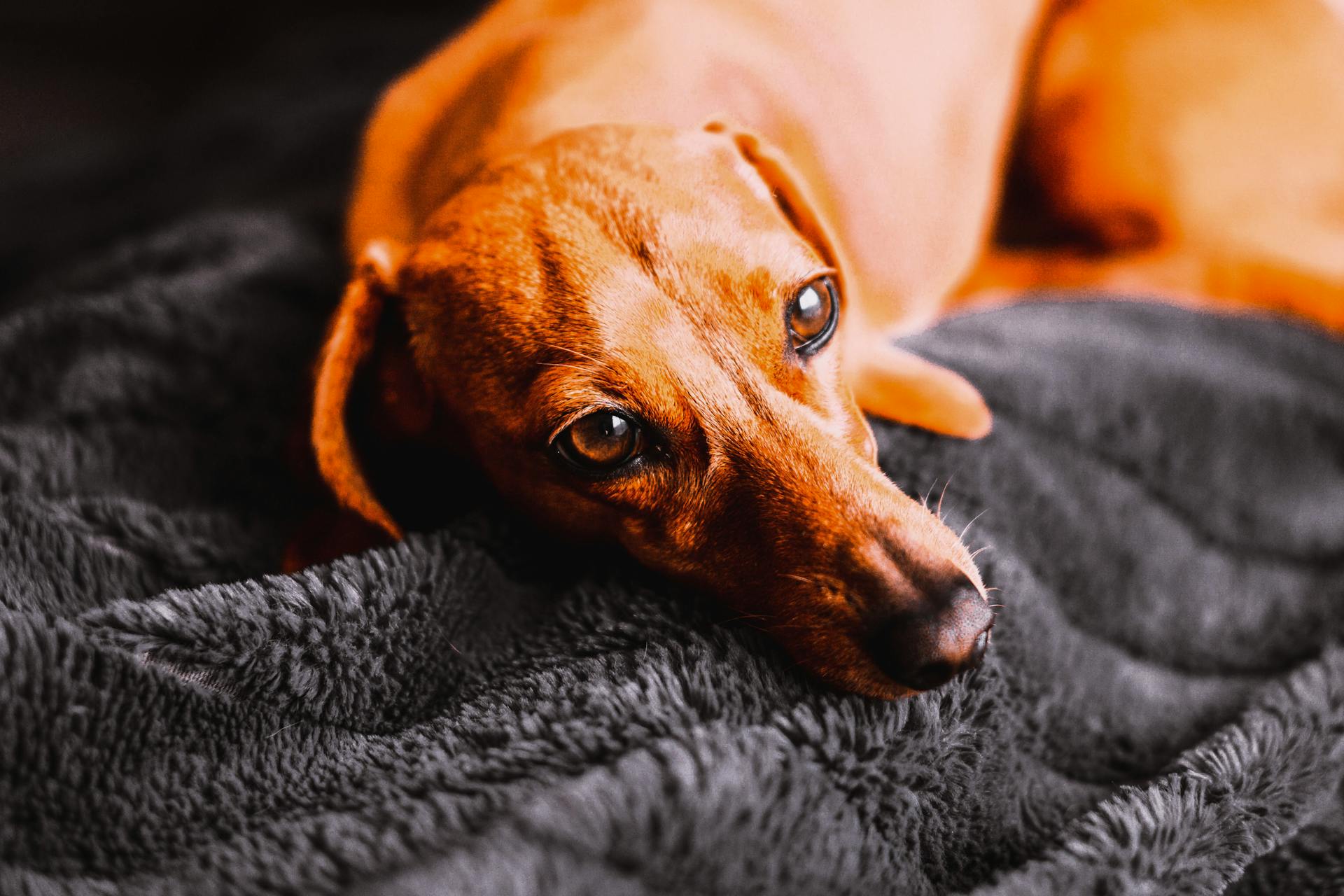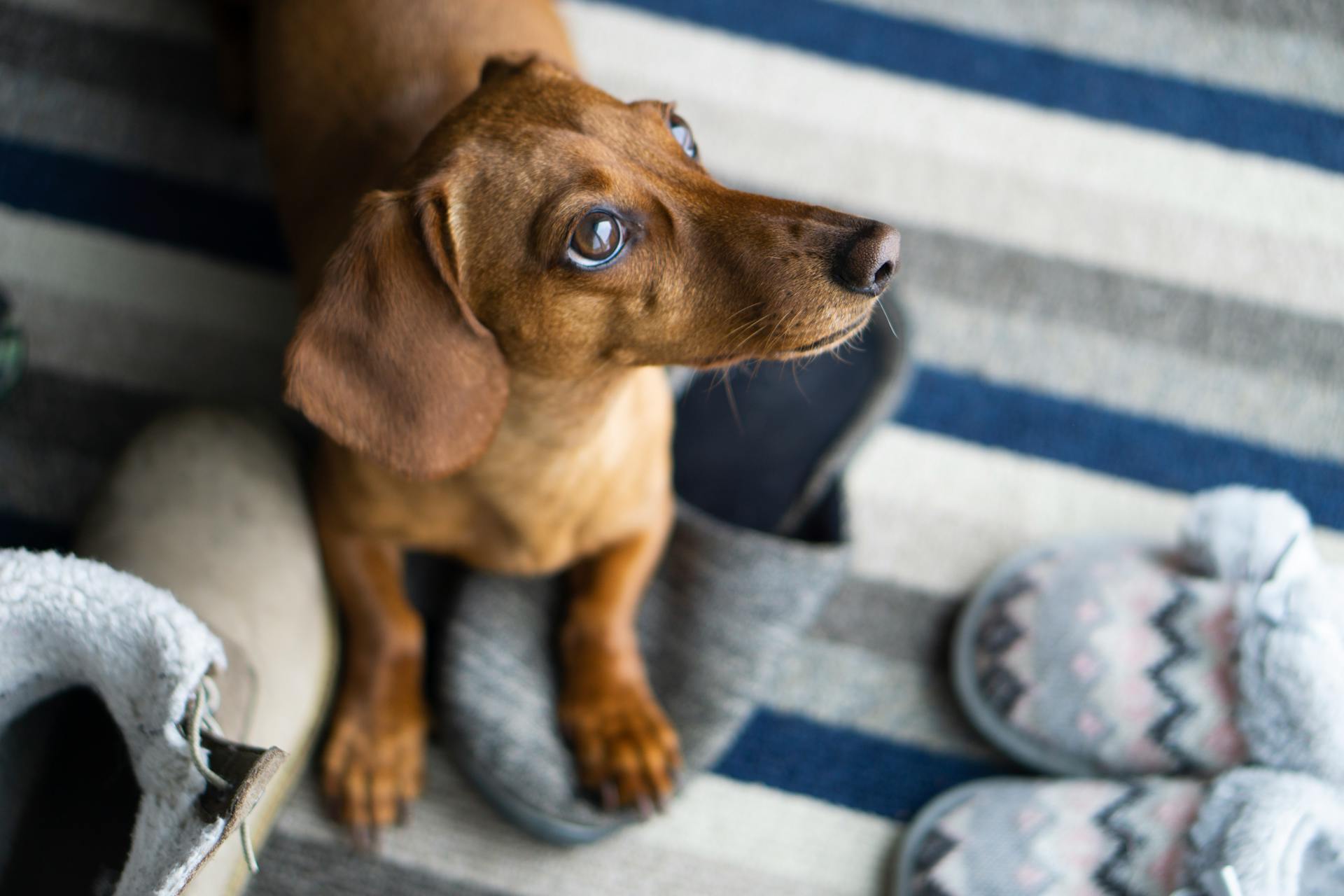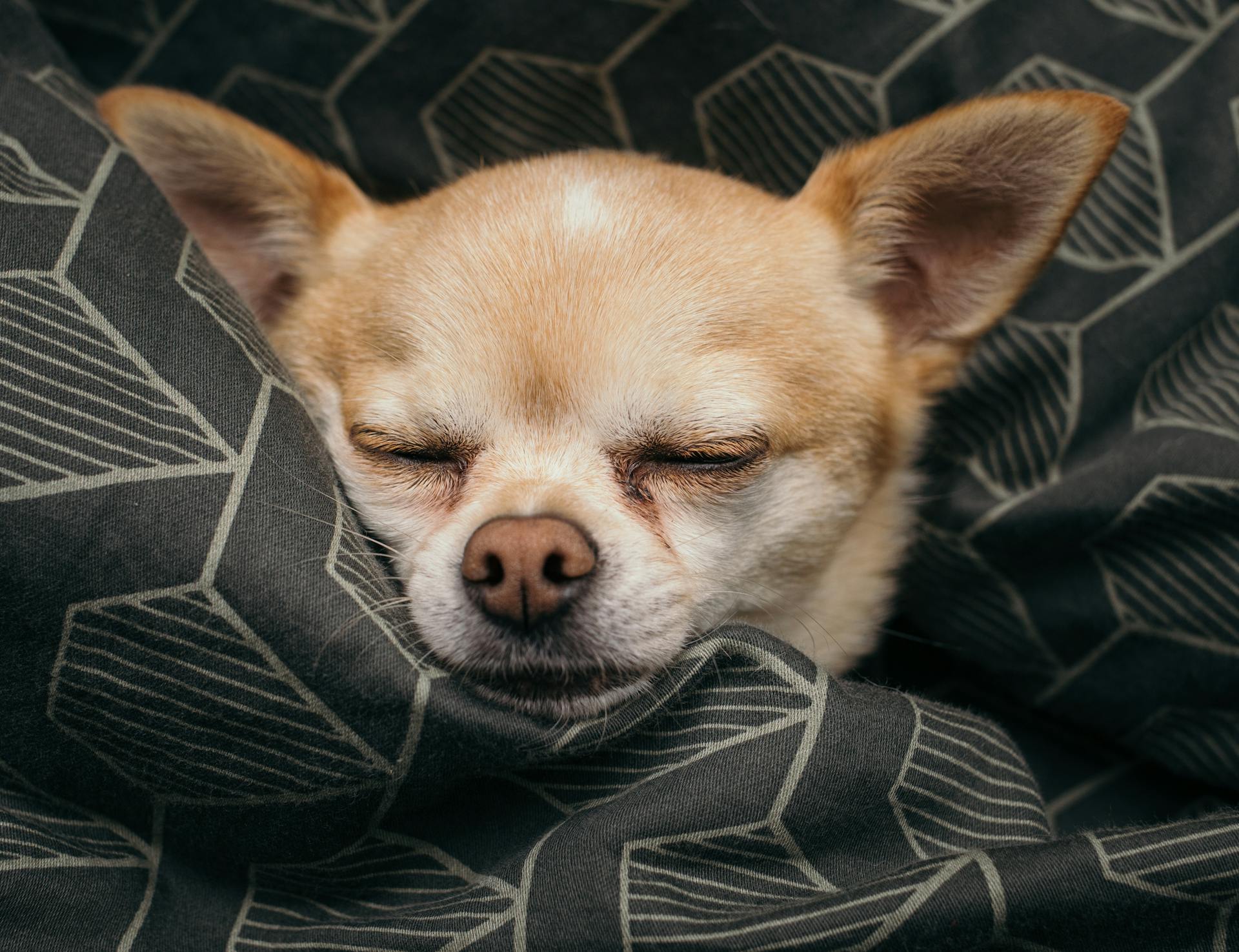
Owning a bandogge can be a rewarding experience, but it's essential to understand their unique needs and characteristics. They require regular exercise, so be prepared to take them on daily walks and playtime.
Bandogges are known for their loyalty and affection towards their families, but they can be wary of strangers. Socialization from an early age is crucial to help them become confident and calm around new people.
Their short coats require minimal grooming, but they do shed heavily, especially during shedding season. Regular brushing can help reduce the amount of loose hair.
Bandogges are intelligent and active dogs, so they need plenty of mental and physical stimulation to prevent boredom and destructive behavior. Providing them with puzzle toys and engaging activities can help keep them happy and healthy.
On a similar theme: Bandogges Mc
Temperament and Personality
The American Bandogge Mastiff is a unique breed with a complex temperament and personality. They are bred as guard dogs, so it's no surprise they have protective instincts, but they can also make wonderful companions in the right hands.
Bred as guard dogs, they are incredibly devoted to their family and can exhibit aggressive tendencies if not properly trained and socialized at an early age. However, they are generally an affectionate and devoted companion with their family.
American Bandogges are highly intelligent and obedient, making them easy to train, but only if the owner knows what they're doing. They need strong leadership and don't respond well to mixed signals and unconfident training.
Here are some key personality traits to consider:
- Devoted and affectionate towards family
- Protective of their family, but can be suspicious of strangers
- Generally calm, but can have high energy and hyperactivity if not properly exercised
- Intelligent and eager to please
- Can do well with children when raised with them and properly socialized
It's essential to remember that each dog is an individual, and their behavior is shaped by their upbringing, training, and environment. Responsible ownership, proper training, and socialization are crucial in ensuring American Bandogges are well-behaved and loving companions.
Check this out: Gsd Guard Dog Training
Training and Socialization
Training and socialization are crucial for the American Bandogge Mastiff. Consistent owners and positive reinforcement training methods like treats and praise work best for this breed.
Training should begin early, ideally as puppyhood, and continue throughout the dog's lifetime. Enrolling in puppy obedience classes can be beneficial.
Positive reinforcement training techniques like treats and praise are essential, while aversive techniques like scolding or punishment should be avoided. The American Bandogge Mastiff is sensitive and wants to please its owner.
Training should be short, game-like, and fun to keep the dog's interest. Investing in quality training treats that are high-value for the dog is recommended.
High-value treats are small, chewy, and smelly, tapping into the dog's senses. They're also a healthier alternative to other training treats.
Socialization is vital for this breed, as it's a guard dog prone to wariness around strangers and animals it wasn't raised with. Early socialization can reduce fear and anxiety in the dog.
Introduce the American Bandogge Mastiff to new sights, sounds, experiences, and people to create positive first impressions. This can help reduce potential behavioral issues and fear-based aggression or territorial behaviors.
A solid recall and basic cues like sit, stay, lay down, and drop it are essential. The American Bandogge Mastiff has a high prey drive and may become protective, so it's crucial to work on these cues.
Grooming and Care
The American Bandogge is a relatively low-maintenance breed when it comes to grooming. They have a short and dense coat that doesn't require frequent brushing.
Weekly brushing with a bristle brush or grooming mitt will help remove loose hair and keep the coat in good condition. This will also help prevent matting and tangling.
The American Bandogge sheds lightly, but may shed more heavily during the shedding season in spring and fall. A good, thorough brushing once or twice a week depending on the season will help manage this.
It's essential to check your dog's ears routinely and keep them clean and clear of debris, moisture, or waxy buildup that could lead to ear infections.
Trimming your Bandogge's nails regularly will keep them at a comfortable length and prevent discomfort and difficulty walking. Use a dog nail clipper or grinder and be cautious not to cut into the quick.
The American Bandogge needs regular dental care to prevent dental issues. Brush their teeth at least once a day using a dog-specific toothbrush and toothpaste, and consider using dental chews and toys to aid in oral health.
Bathing your Bandogge should be done carefully, as they can suffer from allergies and skin issues. Bathing once every six weeks unless they get particularly dirty in the meantime is usually sufficient, and use a hypoallergenic dog shampoo made for dogs with sensitive skin.
Explore further: How to Keep Livestock Guardian Dogs from Roaming
Lifespan and Health
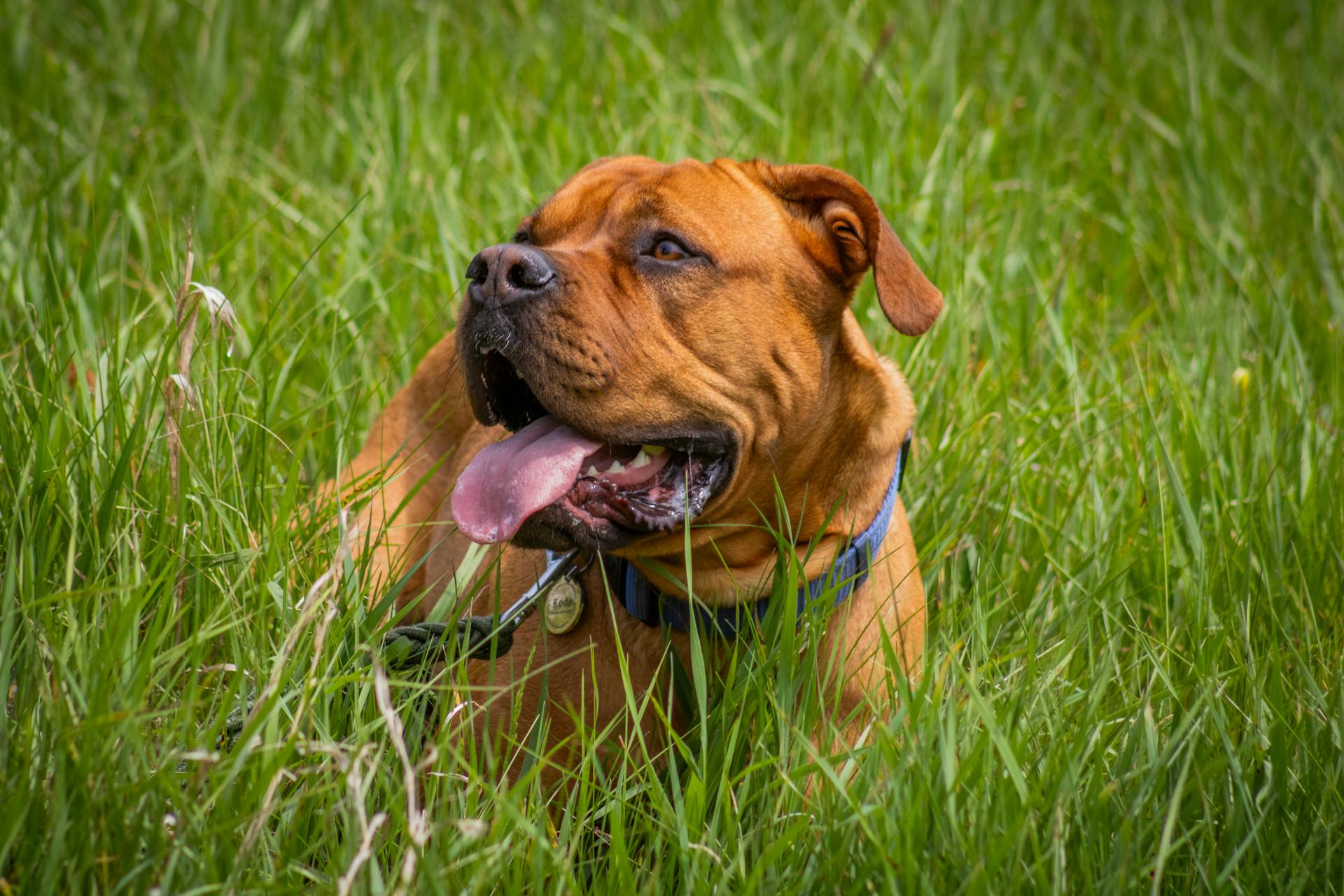
The American Bandogge Mastiff is a large breed with a relatively decent lifespan of around 10 to 11 years. This is thanks in part to hybrid vigor, which can make mixed-breed dogs healthier than purebreds.
However, like many large breeds, the American Bandogge Mastiff is prone to certain health issues. These include hip dysplasia, elbow dysplasia, and brachycephalic airway syndrome.
Bloat, also known as Gastric Dilatation Volvulus, is a serious condition that can be life-threatening. It occurs when air or gas fills the stomach and intestines, causing them to flip. Regular veterinarian visits and a proper diet can help prevent or combat this condition.
Here are some common health issues that can affect the American Bandogge Mastiff:
- Hip dysplasia
- Elbow dysplasia
- Brachycephalic airway syndrome
- Bloat (Gastric Dilatation Volvulus)
- Progressive retinal atrophy
- Epilepsy, Autoimmune Thyroiditis
- Cancer, Skin Issues
Regular veterinary check-ups, a nutritious diet, and exercise can help promote the overall health and longevity of your American Bandogge Mastiff.
Exercise
The American Bandogge Mastiff needs regular exercise to stay happy and healthy. They require around 1 hour of daily exercise, which can be broken down into one or two medium-length walks per day.
A good 45 minutes to an hour walk a day is ideal for this breed. This duration allows them to get enough physical activity without overexerting themselves.
Because of their strong prey drive, it's essential to provide a securely fenced backyard for free playtime. A fence that is at least six feet in height and dig-proof is recommended to prevent escape attempts.
It's crucial to keep your Bandogge on a leash and harness during walks, especially in areas with potential distractions. A quality no-pull dog harness and leash can help redirect pulling behavior.
American Bandogges are prone to brachycephalic airway syndrome, so it's best to avoid using prong collars or choke chains. These can exacerbate respiratory issues and increase the risk of heat stroke.
Mental stimulation is just as important as physical exercise for this breed. Engage your Bandogge with puzzle toys, food-related games, and other forms of mental engagement to keep them happy and content.
Intriguing read: Dog Breed Mountain Feist
Feeding
Feeding your American Bandogge requires attention to their high energy levels and nutritional needs. Opt for reputable dog food brands that offer a complete and balanced diet.
High-quality protein sources, healthy fats, and essential vitamins and minerals are crucial for their diet. Portion control is essential to prevent overfeeding and maintain a healthy weight.
Establish a consistent feeding schedule with two or three meals per day. Ensure access to fresh and clean water at all times.
Be mindful of any dietary restrictions or sensitivities your Bandog may have. Regular monitoring of their body condition and overall health is important to ensure they are thriving on their diet.
Using slow feeder bowls can help prevent bloat, a known concern for this breed. Engaging activities like seeking games can help burn off excess energy and stimulate their mind.
Size and Space
The American Bandogge is a large and muscular breed, with males typically standing between 24 to 29 inches tall at the shoulder.
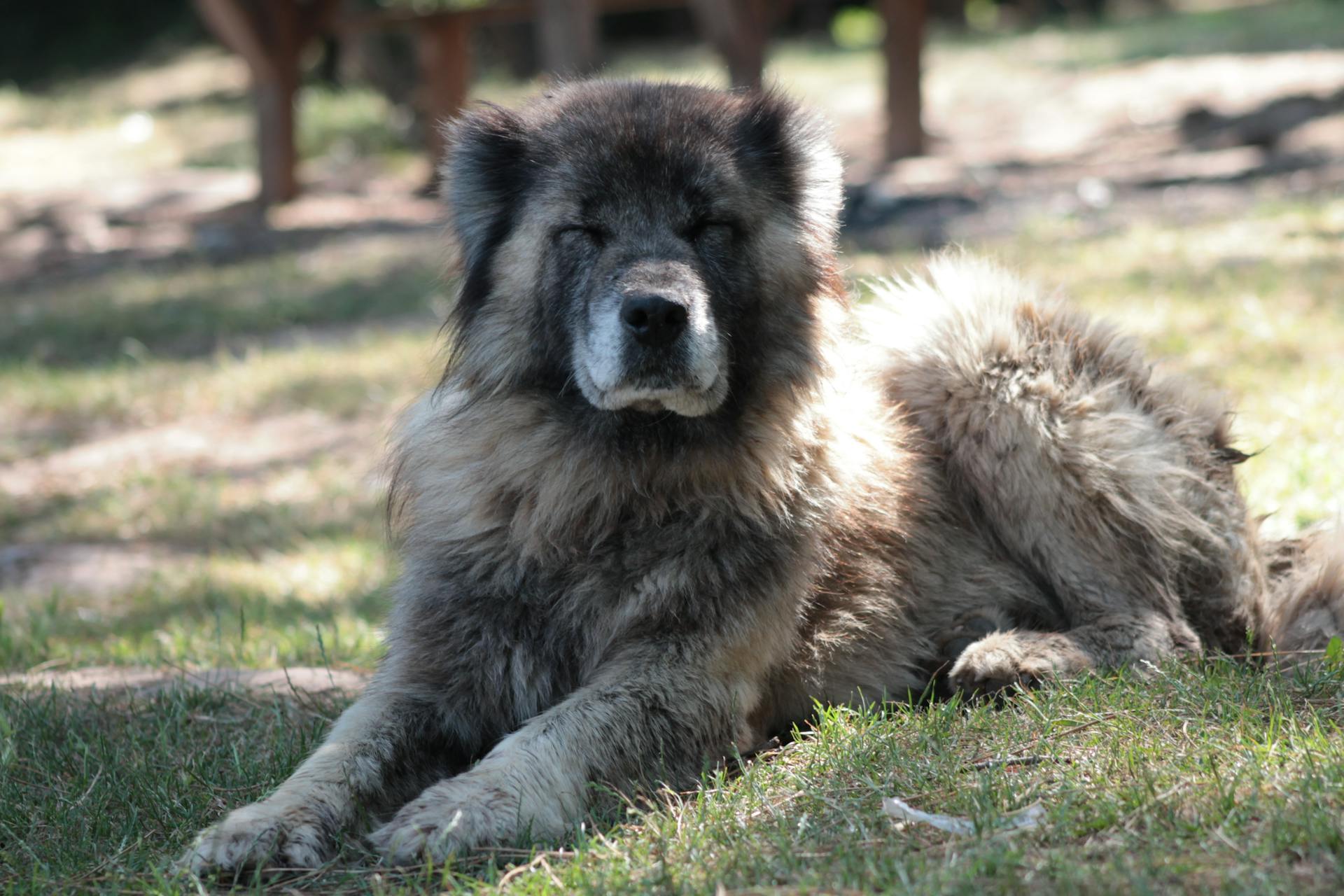
Females are slightly smaller, ranging from 22 to 27 inches in height.
Males usually weigh between 80 to 140 pounds, which is a significant amount of muscle mass.
Their size requires a substantial amount of space, so make sure you have a large area for your American Bandogge to roam and exercise.
The average weight of an American Bandogge is around 110 pounds, which is a good benchmark for planning their living space.
For more insights, see: American Mastiff vs English Mastiff
Family and Pets
American Bandogge Mastiffs can make excellent family dogs, but they're not suitable for families with young children who can't handle their strength. They're better suited to families with responsible older children.
Proper socialization and supervision are key to ensuring a harmonious environment between Bandogs and other pets. With proper introductions and socialization from an early age, larger animals like cats can coexist with this breed.
However, introducing another pet later in an American Bandogge's life can create problems, so it's best to introduce them as puppies. They're generally aggressive towards animals that aren't part of their family unit.
Related reading: Livestock Guardian Animals
American Bandogge Mastiffs are protective and loyal to any people and animals they consider part of their pack, making them excellent home defenders. They're naturally protective of their family and can get defensive around strangers suddenly.
With proper training, socialization, and responsible ownership, American Bandogges can be great companions for families and pets. They can even make great therapy dogs with the right temperament and behavior.
For more insights, see: Bernese Mountain Dog Guard
Cost and Essentials
The cost of owning a Bandogge Mastiff can be a significant investment. The most expensive puppies can fetch prices upwards of $2,500 from top-of-the-line breeders.
You'll also need to consider the cost of food, veterinary care, and supplies, which can add up quickly. A Bandogge Mastiff's large size means they'll need plenty of high-quality food to maintain their health.
Their size also means they'll require regular grooming to prevent matting and tangling of their coat.
Readers also liked: How Big Can a Tibetan Mastiff Get
They Can Be Expensive
American Bandogge Mastiff puppies can fetch prices upwards of $2,500 from top-of-the-line breeders.
You may be surprised to learn that the most expensive puppies can cost a pretty penny.
The price tag can be quite steep, especially if you're looking for a high-quality puppy from a reputable breeder.
In fact, some breeders may charge upwards of $2,500 for their puppies.
This is a significant investment, and it's essential to consider the costs before bringing a new furry friend home.
Owning Essentials
Owning a home can be a significant financial burden, with the average cost of a down payment alone being around $40,000.
The cost of homeowners insurance can vary greatly depending on the location, with some areas requiring coverage for natural disasters like hurricanes or wildfires.
Home maintenance costs can add up quickly, with the average homeowner spending around $1,500 per year on repairs and replacements.
A well-maintained roof can last up to 30 years, but neglecting it can lead to costly repairs or even a new roof installation.
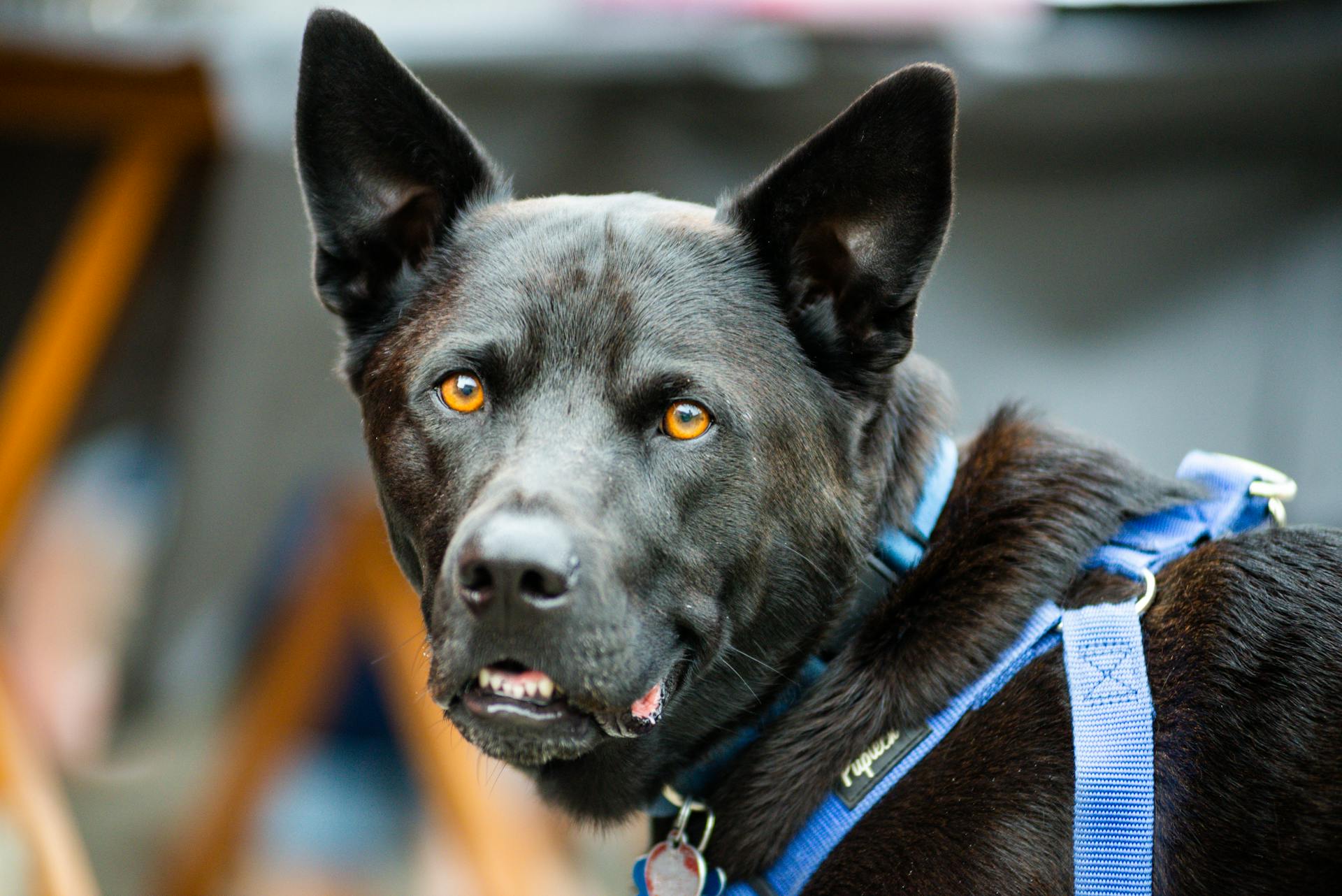
Regular HVAC maintenance can help reduce energy bills by up to 30%, saving homeowners hundreds of dollars per year.
The cost of replacing a water heater can range from $300 to $1,500, depending on the type and size of the unit.
A programmable thermostat can help homeowners save up to $150 per year on their energy bills by optimizing heating and cooling usage.
History and Origins
The American Bandogge, also known as the Bandog, has a rich history that dates back thousands of years. The Mastiff, one of the oldest dog breeds, was used as a war dog, guardian, and protector in ancient times.
The Mastiff was prized for its size, strength, and loyalty, and was brought to different regions around the world, including Britain, where it continued to evolve. The American Bulldog, on the other hand, has a more recent history, originally bred for working purposes such as herding livestock and guarding property.
The intentional crossbreeding of Mastiffs and American Bulldogs to create the American Bandogge began in the 1960s. Breeders aimed to combine the best traits of both parent breeds, resulting in a powerful and versatile working dog.
The goal was to produce a dog with the size, strength, and protective instincts of the Mastiff, combined with the athleticism and work ethic of the American Bulldog. The Bandog has gained recognition and popularity among enthusiasts who appreciate its unique combination of traits.
However, it’s worth noting that the Bandog is not recognized as a standardized breed by major kennel clubs. It is primarily considered a crossbreed or a working dog type.
Quick Facts and Tips
The American Bandogge is a large breed with impressive size credentials: males can reach 25-30 inches in height and weigh 100-150 pounds, while females top out at 23-28 inches and 80-120 pounds.
The breed group for the American Bandogge is Working, which tells you a lot about their purpose and abilities. They're also known for being intelligent, loyal, protective, and calm - a great combination for a pet.
Here are some exercise needs to keep in mind: the American Bandogge requires 60-90 minutes of exercise per day. This is a significant commitment, but it's worth it for the health and happiness of your dog.
The American Bandogge Mastiff is a relatively new breed, developed in the United States in the 1970s, and is recognized by the US Service & Support Animal Registration as a breed that possesses qualities that make it an excellent service or support animal.
You might like: Bernese Mountain Service Dog
Quick Facts
The American Bandogge Mastiff is a large breed with a rich history. Originating in the United States, this breed is a relatively new one, developed in the 1970s.
Here are some key facts about the American Bandogge Mastiff:
- Male American Bandogge Mastiffs stand between 25-30 inches tall and weigh 100-150 pounds, while females stand between 23-28 inches tall and weigh 80-120 pounds.
- The American Bandogge Mastiff is a member of the Working breed group.
- This breed has an average lifespan of 10-12 years.
- The American Bandogge Mastiff has a short, smooth coat that requires weekly brushing.
- They are intelligent, loyal, protective, and calm animals.
- This breed requires 60-90 minutes of exercise per day, making it essential to provide regular physical activity.
- Early and consistent training is crucial for the American Bandogge Mastiff, as they can be strong-willed at times.
- Unfortunately, the breed is prone to some common health problems, including hip dysplasia, elbow dysplasia, and eye problems.
- The American Bandogge Mastiff is recognized by the US Service & Support Animal Registration as an excellent service or support animal due to its exceptional qualities.
3 Little-Known Facts
Here are three little-known facts that might just change the way you approach your daily routine.
Did you know that drinking water can increase your metabolism by 10-15%? This is because water helps to boost your energy levels and support your body's natural processes.
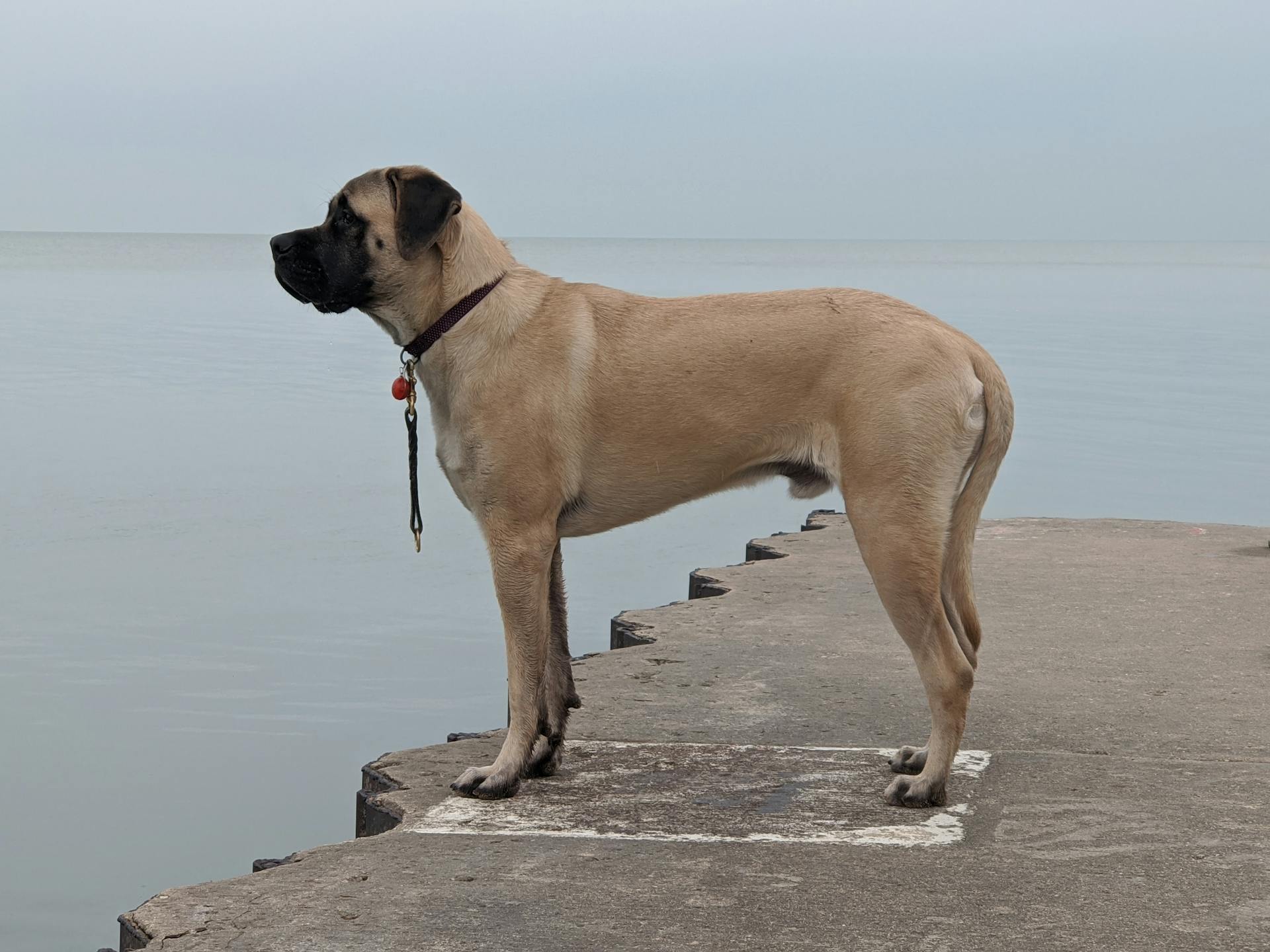
The average person loses about 1-2 cups of water per day through sweat, which can lead to dehydration if not replenished. Staying hydrated is key to maintaining your physical and mental well-being.
Research has shown that the human brain can only process a certain amount of information at a time, which is why it's essential to prioritize your tasks and focus on one thing at a time. This can help you stay productive and avoid feeling overwhelmed.
Frequently Asked Questions
What two breeds make a Bandogge?
A Bandogge is bred by crossing an American Pit Bull Terrier with a Neapolitan Mastiff. This unique combination gives rise to a powerful and distinctive breed.
Is a Bandog a pitbull?
A Bandog's ancestry includes the American Pit Bull Terrier, but it's a distinct breed with unique characteristics. While it shares some physical and temperamental traits with pitbulls, the Bandog has a distinct history and lineage.
What are the health problems with Bandogge?
The American Bandogge is prone to various health issues, including hip and elbow dysplasia, eye diseases, and skin problems. Additionally, its deep chest makes it susceptible to gastric dilatation volvulus, a life-threatening condition.
What is the difference between a Cane Corso and a Bandog?
Difference between a Cane Corso and a Bandog: Cane Corsos are more adaptable and suitable for indoor living, while Bandogs are larger and more challenging to train due to their independent nature
Why is it called a Bandog?
The Bandog breed gets its name from its historical practice of being chained or "banded" during the day, then released to roam and guard at night. This unique history has shaped the breed's characteristics and behavior.
Featured Images: pexels.com
